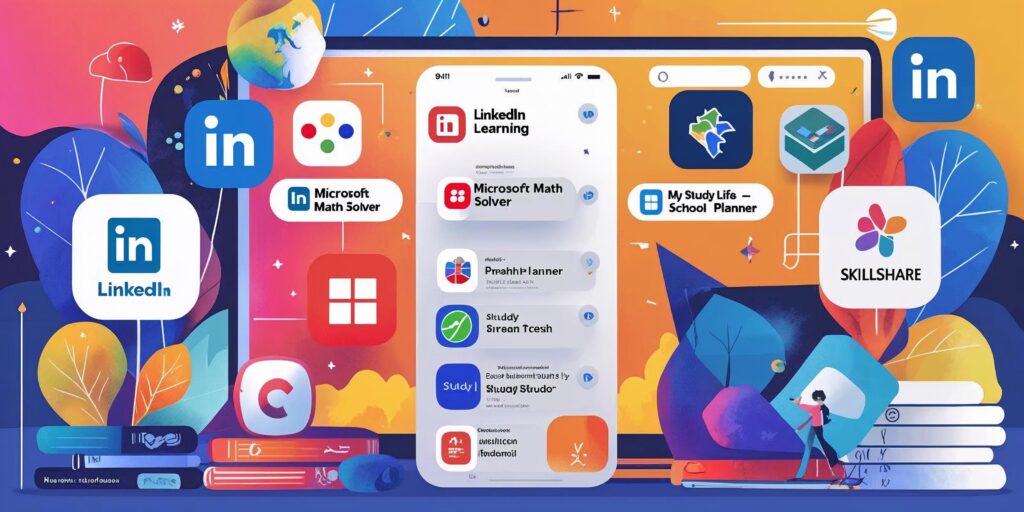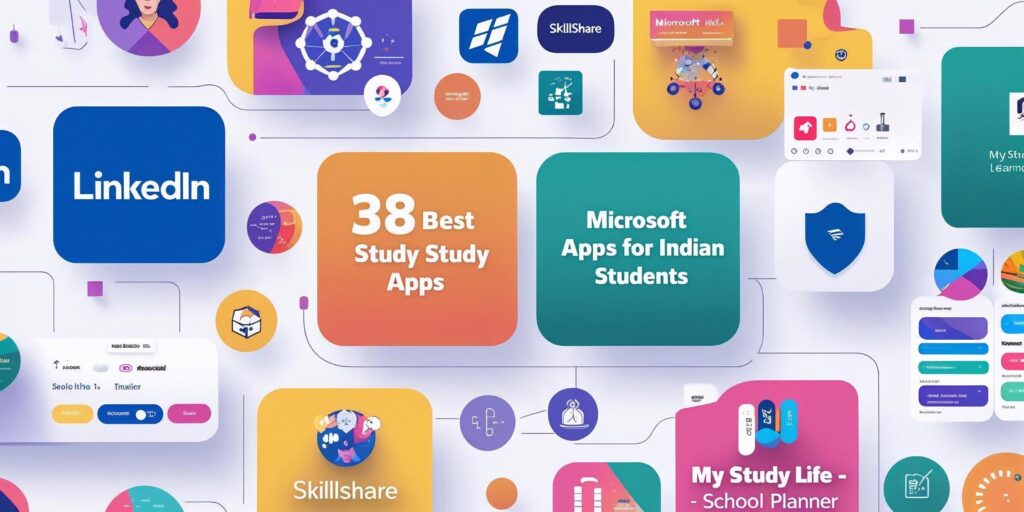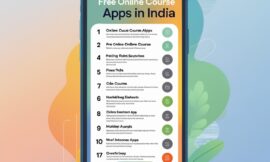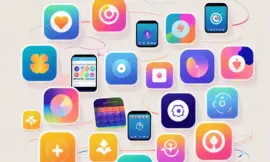38 Best Study Apps for Indian Students – Pros, Cons & Pricing Guide

Hey there! 📚
Let’s be honest—studying in 2025 is nothing like what it used to be.
Gone are the days when students relied only on heavy textbooks, last-minute notes, and chalkboard lessons.
Now, learning happens on your phone, tablet, or laptop.
And it’s faster, more interactive, and sometimes even fun.
Did you know?
According to a 2024 Statista report, over 70% of Indian students now use at least one educational app to prepare for exams, improve skills, or learn something new outside the classroom.
Whether it’s cracking the JEE/NEET, mastering coding, or improving your English speaking skills, there’s an app for almost everything.
Now, here’s the kicker—while there are hundreds of study apps, not all are worth your time.
Some are absolute gems with amazing features, while others are just… well, average.
So, I’ve put together a complete checklist of the 38 best study apps Indian students swear by in 2025—with pros, cons, and pricing.
So you can choose wisely.
Now, let’s move to the topic…
38 Best Study Apps for Indian Students

1. BYJU’S – The Learning App
Best for: School students (Class 4–12), NEET, JEE, UPSC aspirants
Pros:
- Beginner-friendly interface and engaging video lessons
- Covers NCERT syllabus with animations
- Doubt-solving support available
Cons:
- Premium subscription can be expensive for some families
- Limited offline access for free users
Pricing:
- Free basic content
- Premium: ₹3,000 – ₹15,000/year (depends on course)
2. Unacademy
Best for: Competitive exams like UPSC, SSC, Bank, CAT, JEE, NEET
Pros:
- Live classes with top educators
- Structured syllabus with daily schedules
- Practice tests & quizzes
Cons:
- Can be overwhelming for absolute beginners
- Recorded lectures sometimes lack interactivity
Pricing:
- ₹299 – ₹1,500/month (depending on plan)
3. Toppr
Best for: Class 5–12, JEE, NEET preparation
Pros:
- Step-by-step explanations for every question
- AI-based learning path
- Doubt-solving via chat
Cons:
- Limited free content
- App size is heavy
Pricing:
- Free trial available
- Premium: ₹3,000 – ₹10,000/year
4. Doubtnut
Best for: Instant doubt solving (Math & Science)
Pros:
- Just take a picture of your question to get a video solution
- Free NCERT solutions
- Great for last-minute revision
Cons:
- Works best for objective questions, not long theory answers
- Occasional irrelevant answers
Pricing:
- Mostly free
- Premium plans start at ₹1,000/year
5. Khan Academy
Best for: Free self-paced learning in multiple subjects
Pros:
- 100% free
- Wide range of subjects including Math, Science, Economics, and more
- Practice exercises after each lesson
Cons:
- Focuses more on theory than exam-specific strategies
- Some topics not fully aligned with Indian syllabus
Pricing:
- Completely free
6. Vedantu
Best for: Live online tutoring for school & competitive exams
Pros:
- Interactive live classes
- Real-time doubt-solving
- Covers school boards and competitive exams
Cons:
- Requires stable internet for smooth experience
- Large class sizes in some courses
Pricing:
- ₹2,000–₹15,000/year (varies by course)
7. Google Keep / Notion (Study Organization)
Best for: Note-taking & organizing study materials
Pros:
- Simple, user-friendly
- Works on all devices
- Free tools, no credit card required
Cons:
- No in-depth academic content, only organization support
Pricing:
- Free
8. Quizlet
Best for: Memorizing terms, flashcards, and quick revision
Pros:
- Fun, game-based learning
- Works offline
- Great for languages and facts
Cons:
- Limited deep learning features
- Free plan has ads
Pricing:
- Free basic
- Premium: ₹300/month
9. Meritnation
Best for: CBSE/ICSE school syllabus support
Pros:
- Video lessons + practice tests
- Doubt-solving help
- Covers NCERT thoroughly
Cons:
- Free content is limited
- Interface could be more modern
Pricing:
- ₹3,000 – ₹10,000/year
10. GradeUp (Now BYJU’S Exam Prep)
Best for: Government job & competitive exams
Pros:
- Mock tests & quizzes
- Exam-specific study plans
- Live sessions with experts
Cons:
- Some advanced content locked behind paywall
Pricing:
- ₹300 – ₹1,200/month
Explore this related post
Best 20 Pomodoro Technique Apps for Focus & Productivity
Best Time-Management Tools & Apps (2025)
Career Guide: What After 10th Grade in India
How to Build a Stunning Website Without Code
11. Udemy
Best for: Skill-based courses (coding, design, business, etc.)
Pros:
- Affordable one-time purchases
- Lifetime access to courses
- Real examples from industry experts
Cons:
- Quality varies by instructor
- Not live, only recorded sessions
Pricing:
- ₹399 – ₹3,499 per course
12. Coursera
Best for: University-level courses & certifications
Pros:
- Courses from top global universities
- Professional certificates available
- Flexible schedules
Cons:
- Premium courses are costly
- Some courses not fully localized for Indian needs
Pricing:
- Free audit option
- ₹3,000–₹5,000/month for premium
13. Duolingo
Best for: Learning new languages
Pros:
- Fun, game-style learning
- Beginner-friendly
- Tracks your progress daily
Cons:
- Not for advanced learners
- Focused more on vocabulary than grammar
Pricing:
- Free with ads
- Plus: ₹499/month
14. WhiteHat Jr.
Best for: Coding for kids & teens
Pros:
- Live coding classes
- Beginner-friendly
- Step-by-step learning
Cons:
- Very expensive compared to others
- Controversial aggressive marketing
Pricing:
- ₹6,000 – ₹50,000/course
15. LinkedIn Learning
Best for: Career-focused skill building
Pros:
- Industry-recognized certifications
- Practical, work-ready skills
- Includes soft skills courses
Cons:
- Mostly for older students & professionals
- Requires subscription
Pricing:
- ₹1,400/month
16. Microsoft Math Solver
Best for: Instant math problem solutions
Pros:
- Step-by-step solutions
- Free tools, no credit card required
- Covers algebra, calculus, trigonometry
Cons:
- Not useful for non-math subjects
Pricing:
- Free
17. Photomath
Best for: Solving math problems with explanations
Pros:
- Easy to use—just take a picture
- Works offline
- Explains each step
Cons:
- Not for theory-based questions
Pricing:
- Free basic
- Plus: ₹350/month
18. Brainly
Best for: Peer-to-peer homework help
Pros:
- Students help each other
- Covers a wide range of subjects
- Free tools available
Cons:
- Quality of answers can vary
- Needs moderation
Pricing:
- Free
19. Evernote
Best for: Organized note-taking
Pros:
- Multi-device sync
- Tagging & search features
- Beginner-friendly
Cons:
- Premium needed for advanced features
Pricing:
- Free basic
- Premium: ₹190/month
20. Socratic by Google
Best for: Quick AI-powered study help
Pros:
- Uses AI to explain concepts
- Supports multiple subjects
- Free tools available
Cons:
- Limited in-depth explanations
Pricing:
- Free
21. Simplilearn
Best for: Professional certifications & advanced skills
Pros:
- Industry-focused courses
- Placement assistance in some programs
Cons:
- Expensive for students
Pricing:
- ₹5,000 – ₹50,000/course
22. Testbook
Best for: Government exam preparation
Pros:
- Thousands of mock tests
- Detailed solutions
- Affordable pricing
Cons:
- Limited coverage for non-govt exams
Pricing:
- ₹300 – ₹500/month
23. EdX
Best for: Learning from global universities
Pros:
- Courses from MIT, Harvard, IITs
- Certificates available
Cons:
- Some courses pricey
Pricing:
- Free audit
- ₹4,000 – ₹15,000/certificate
24. Skillshare
Best for: Creative skills like design, video editing, etc.
Pros:
- Project-based learning
- Beginner-friendly
Cons:
- Subscription needed for all content
Pricing:
- ₹1,200/month
25. myCBSEguide
Best for: CBSE board students
Pros:
- NCERT solutions, sample papers, mock tests
- Covers Class 3–12
Cons:
- Limited interactive content
Pricing:
- Free basic
- Premium: ₹500/year
26. Google Drive
Best for: Storing and sharing study materials
Pros:
- Free cloud storage up to 15GB
- Easy file sharing and collaboration
- Works across all devices
Cons:
- Requires internet for access (unless files are made offline)
- Limited free storage
Pricing:
- Free (15GB)
- Google One: ₹130/month (100GB), ₹650/month (2TB)
27. Grammarly
Best for: Improving English writing and grammar
Pros:
- Real-time grammar and spelling checks
- Style and tone suggestions
- Works on browsers, MS Word, Google Docs
Cons:
- Free version is limited to basic corrections
- Premium is pricey for students
Pricing:
- Free basic
- Premium: ₹1,200/month approx.
28. My Study Life – School Planner
Best for: Organizing class schedules and assignments
Pros:
- Tracks homework, exams, and classes in one place
- Syncs across devices
- Free tools, no credit card required
Cons:
- No in-built study content, only planning features
Pricing:
- Free
29. Microsoft Lens
Best for: Scanning and digitizing notes
Pros:
- Turns paper notes into clear PDFs
- Works with OneDrive, Word, PowerPoint
- Beginner-friendly interface
Cons:
- Works best with stable lighting conditions
- No advanced editing features

Pricing:
- Free
Check out this comparison
Top 5 Study Apps for Indian Students in 2025
30. Dragon Dictation
Best for: Voice-to-text note-taking
Pros:
- Converts speech to text quickly
- Hands-free note-taking
- Useful for recording lectures
Cons:
- Accuracy depends on pronunciation and clarity
- Requires internet connection
Pricing:
- Free basic
- Premium plans vary
31. StudyBlue
Best for: Creating and using flashcards
Pros:
- Make your own flashcards or use others’
- Syncs across devices
- Good for memorization
Cons:
- Interface is a bit outdated
- Limited free content
Pricing:
- Free basic
- Premium: ₹500/month
32. SimpleMind
Best for: Mind mapping and idea organization
Pros:
- Helps visually plan and connect ideas
- Great for brainstorming projects
- Beginner-friendly
Cons:
- No in-built academic content
- Paid version needed for full features
Pricing:
- Free basic
- Premium: ₹450 one-time
33. TED
Best for: Inspiring talks and knowledge sharing
Pros:
- Thousands of expert talks on various topics
- Free access
- Improves listening and critical thinking skills
Cons:
- Not structured for exam prep
- No direct practice tools
Pricing:
- Free
34. Todoist
Best for: Task management and productivity
Pros:
- Organizes assignments and deadlines
- Priority tagging for urgent tasks
- Works across devices
Cons:
- No in-built learning content
- Some features require premium
Pricing:
- Free basic
- Premium: ₹300/month
35. GoConqr
Best for: Creating study resources like mind maps, quizzes, and flashcards
Pros:
- All-in-one study tool
- Community sharing of resources
- Good for group projects
Cons:
- Requires account login for most features
- Free version has limits
Pricing:
- Free basic
- Premium: ₹300–₹500/month
36. Kahoot!
Best for: Fun quiz-based learning
Pros:
- Interactive quizzes
- Great for group study
- Works on mobile and desktop
Cons:
- Needs internet for most features
- Limited question types in free version
Pricing:
- Free basic
- Premium: ₹600/month
37. Sololearn
Best for: Learning coding and programming languages
Pros:
- Covers Python, Java, C++, HTML, and more
- Gamified lessons
- Free tools available
Cons:
- Not ideal for advanced programmers
- Some content locked for pro users
Pricing:
- Free basic
- Pro: ₹500/month
38. Forest
Best for: Staying focused while studying
Pros:
- Encourages focus with a tree-growing concept
- Helps reduce phone distractions
- Beginner-friendly interface
Cons:
- Doesn’t track study materials, only focus time
- Paid app for full features
Pricing:
- ₹190 one-time
Final Thoughts on 38 Best Study Apps for Indian Students —Choosing the Right Study App in 2025
The bottom line?
There’s no one-size-fits-all app.
Your choice should depend on your goals, budget, and preferred learning style.
For example, if you want free tools, Khan Academy, Socratic, and Microsoft Math Solver are great.
If you’re preparing for competitive exams, BYJU’S, Unacademy, or Testbook might be your fast track to success.
And if you’re looking for career skills, LinkedIn Learning and Coursera are solid investments.
What this means for you is simple—pick 2–3 apps that cover different needs.
That means one for core learning, one for practice, and one for organization.
That’s the complete checklist to study smarter, not harder.
Frequently Asked Questions
Which is the No. 1 app for study?
In 2025, BYJU’S is considered the No. 1 study app in India for its comprehensive syllabus coverage, engaging video lessons, and wide range of exam preparation resources.
Which app is free for students?
Khan Academy is completely free for students, offering high-quality lessons, practice exercises, and videos across multiple subjects without any subscription cost. Other free options include Google Drive, Microsoft Math Solver, and Socratic by Google.
Which app is best for a study plan?
My Study Life is one of the best apps for creating and tracking a study plan. As it helps students organize classes, assignments, and exams in one place. It’s free, beginner-friendly, and works seamlessly across devices.
Which app is best for 10th students?
Toppr is one of the best apps for 10th students. It offers syllabus-aligned lessons, practice tests, and instant doubt-solving for CBSE, ICSE, and state boards. It’s designed to make exam preparation more structured and effective.
















